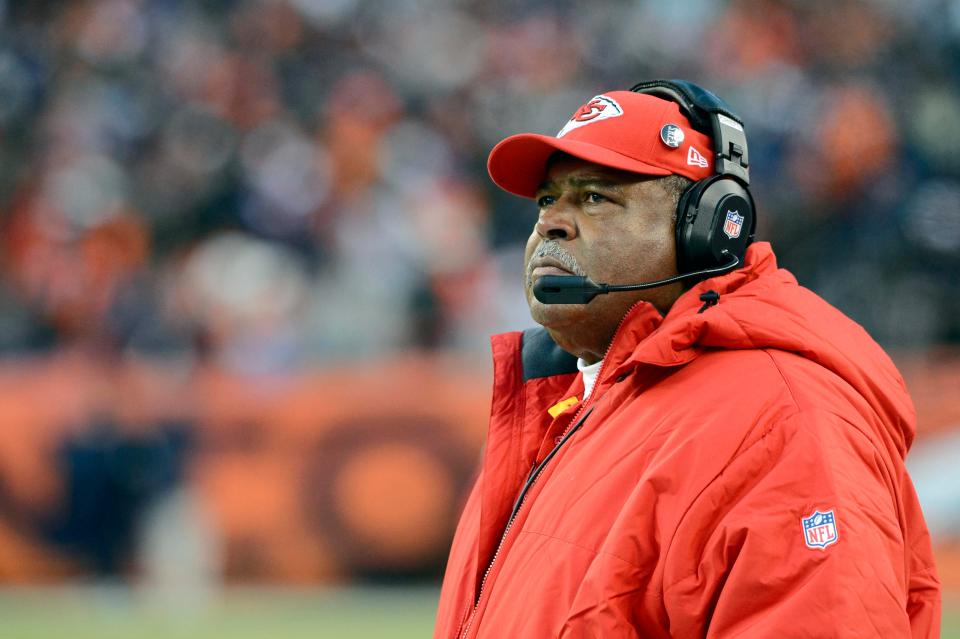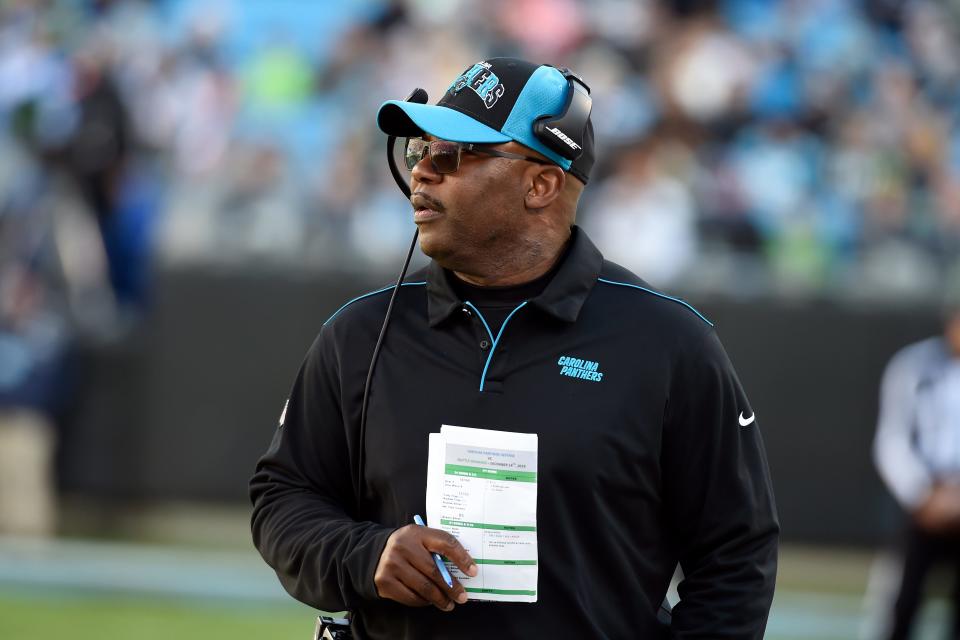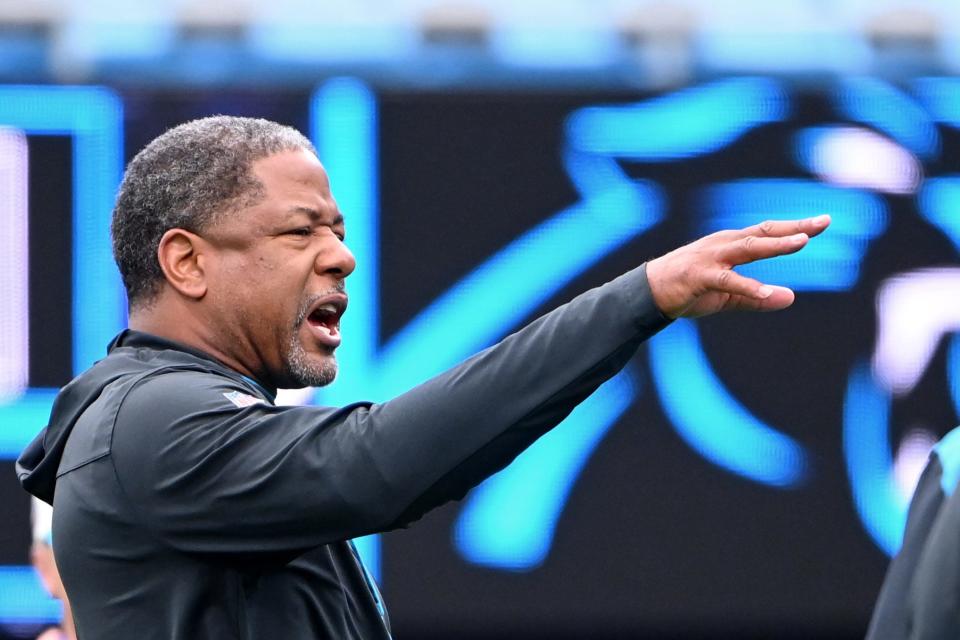What's in it for interims? Carolina's Steve Wilks latest Black coach thrust into challenging role
When the Atlanta Falcons fired Dan Quinn five games into the 2020 season and promoted Raheem Morris to interim head coach, a reporter asked owner Arthur Blank a straightforward question: Would Morris be a candidate for the team’s full-time job?
“Absolutely,” Blank said. “If Raheem ends up 11-0, he's going to be, certainly, a candidate.”
Almost two years later, Carolina Panthers owner David Tepper fielded a similar question about his new interim head coach, Steve Wilks. And his answer, while more vague, conveyed the same message.
“No promises were made,” Tepper told reporters earlier this week. “But obviously if he does an incredible job, he’ll have to be in consideration.”
Morris, of course, did not go 11-0 during his interim stint. He interviewed for the full-time head coaching job in Atlanta but was not retained.
History suggests Wilks won’t be, either.
Since 2000, only 26% of interim stints have led to a full-time head coaching job with the same team the following year, according to a USA TODAY Sports analysis. And for Black interim coaches, like Morris and Wilks, the odds are even more bleak.
For interim stints following the firing or resignation of the previous head coach, USA TODAY Sports found Black interim coaches are retained at marginally lower rates than their white counterparts — 21% compared to 29% — despite having shorter interim stints and winning a higher percentage of games, on average.
The last Black interim to earn a full-time job with the same team was Romeo Crennel in 2011.
“The interim head coach doesn't lead to (expletive) — excuse my French,” NFL executive vice president of football operations Troy Vincent told USA TODAY Sports.
He compared the interim role to titles like “assistant head coach," which aren’t really the career catapults they would appear to be.
“Those are just titles that we call placeholders,” Vincent continued. “Frankly, Black or white, but in particular for the Black (coaches), very few have had the interim head coach and retain the position. You talk about counting (them on) less than one hand.”

The first Black man to hold an interim head coaching position was Terry Robiskie in 2000, according to data published by The Institute for Diversity and Ethics in Sport (TIDES) at the University of Central Florida. Not including Wilks, whose interim stint will begin Sunday against the Los Angeles Rams, Black coaches have held 14 of the 38 interim coaching stints in the two-plus decades since — or about 37%.
Only three of those coaches — Romeo Crennel, Leslie Frazier and Mike Singletary —were hired as the team’s full-time head coach the following year. A fourth, Anthony Lynn, was hired to be the head coach of a different team after his interim stint.
In eight of the 10 other cases, the team hired a white full-time coach to replace a Black interim.
“You get a, ‘Yeah, they did a nice job.’ And then they move on and hire someone who doesn’t look like (them), most of the time” said C. Keith Harrison, a sports business professor at the University of Central Florida and the lead author of the league’s annual diversity and inclusion report.
'A no-win situation'
On the surface, the interim role seems like an audition, a chance for the interim coach to prove to ownership he or she is capable of excelling in the job full-time.
In reality, it’s a slog. The team is losing, morale is typically dwindling and the interim head coach has little ability, or time, to get things turned around.
“There’s not much change you can necessarily implement, other than maybe how you practice, the emphasis of practices,” said University of Maryland head coach Mike Locksley, who founded the National Coalition of Minority Football Coaches in 2020.
Interim stints tend to be brief and brutal. Their average duration since 2000 has been 6.3 games, and interim coaches’ combined win percentage is a paltry .353.
Black coaches have had shorter stints (5.4 games) compared to their white counterparts (6.8 games), and achieved marginally better results — a .382 winning percentage, compared to .340 for white coaches. But Harrison said there doesn’t appear to be any correlation between interim coaches’ records and their odds of being retained.
“When someone's fired and chaos begins, when people lose the locker room, I think the de facto solution is to have men of color as a placeholder,” Harrison said. “And I think their chances of getting the head job, as the data shows, are very slim.”
For many Black coaches, an interim role is the first or only time they will be a head coach in the NFL.
Earl Smith, a professor emeritus at Wake Forest, and Marissa Kiss, a research fellow at the University of Delaware, have been researching how interim roles fit into the broader trajectory of a coach’s career. They noted 20% of the Black head coaches in NFL history worked only as interims. For another 20%, an interim role was the first chance they got to be a head coach.
“I don’t see it as an opportunity, at least not a real opportunity," Smith said. "You check some boxes, you say you did this, even though you know it’s not going to go anywhere. It doesn’t sound nice, but that’s what it looks like, empirically.”

Locksley said he believes interim jobs can actually be perilous for coaches of color, citing the systemic obstacles they already face to earn head coaching jobs.
It’s why he said he initially tried to turn down the interim job at Maryland when it was offered to him midway through the 2015 season, after Randy Edsall’s firing.
“You’re being put in a situation that’s kind of a no-win situation, if you look at it realistically,” said Locksley, whose only previous head-coaching experience to that point had been a 2-26 stint at New Mexico.
“The last thing I needed was to add more losses to my win-loss record, for people to say, ‘Hey, he can’t coach.’ When they look at your record, they don’t say, ‘Well, he was an interim for five, six of those games that he lost.’ Nobody cares.”
Locksley said he eventually accepted the job in large part because of personal relationships with players on the team, many of whom he recruited. The Terrapins went 1-5 in his six games at the helm.
Though Locksley said he later interviewed for the full-time job, Maryland instead hired DJ Durkin, who was later fired after Jordan McNair’s death and an investigation into reports of a toxic culture within the program.
'Time will tell'
The bleak retention figures for interim coaches didn’t give Wilks any pause about taking on the role in Carolina.
“I didn’t blink whatsoever,” he said in a news conference Tuesday. “I’m not worried about the end result. I’m just worried about winning today, and giving us an opportunity to be able to be successful.”
For Wilks, who was promoted in the wake of Matt Rhule’s firing, the next few months are a long-awaited second chance to run an NFL team, albeit under unique circumstances.
The 53-year-old spent 23 years as an assistant coach in college and the NFL before being named head coach of the Arizona Cardinals in 2018. But he was fired after just one season, during which the team finished 3-13.

Wilks is now a plaintiff in the putative class-action lawsuit originally filed by former Miami Dolphins head coach Brian Flores earlier this year. They, with retired assistant Ray Horton, are suing the NFL and several of its teams for alleged discrimination in their hiring and firing practices.
Neither the Panthers nor law firm Wigdor LLP, which represents the plaintiffs, made Wilks available for an interview for this story.
“We’re of course thrilled that he has this opportunity,” said attorney David Gottlieb, a partner at Wigdor. “Does it change anything with respect to the lawsuit? No. Making one decision about one individual does not change what we believe has been an institutional problem with the NFL and with its teams for many, many years.”
The lawsuit alleges the Cardinals hired Wilks only as a “bridge coach” in 2018 and that he “was not given any meaningful chance to succeed.”
When asked if he believes the interim job in Carolina meets those same criteria, Gottlieb said: “Time will tell on that question.”
Carolina is one of four NFL franchises that have hired a Black interim head coach but not a Black full-time coach. Atlanta, Buffalo and Washington are the others.
In a league where roughly 60% of players are Black, nine other teams have never hired a Black head coach.
When asked Tuesday what can be done to address those broader coaching diversity issues in the league, Wilks called it “a tough and ongoing question" but one others are better positioned to answer.
“Only thing that I can do, we can do as African-Americans, is continue to show ... that we can get the job done,” he said. “That’s it.”
Clarification/correction: An earlier version of this story incorrectly identified Ray Horton.
Contributing: Chris Bumbaca and Mike Freeman
Graphics: Ramon Padilla
Contact Tom Schad at tschad@usatoday.com or on Twitter @Tom_Schad.
This article originally appeared on USA TODAY: Interim NFL coaches seen as placeholders, especially if they're Black

